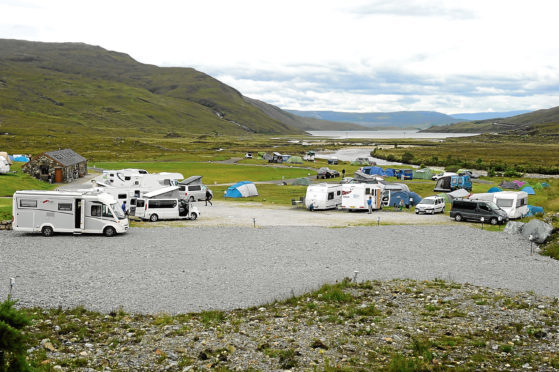Something unexpected occurred at Speyside Wildlife in the year following the vote to leave the European Union (EU). Among all the doom-mongering and uncertainty, during 2017 the Aviemore-based holiday and tour company celebrated one of the busiest seasons in its 27-year history.
“We had to work very hard for that,” explains founder and owner Sally Dowden. “Immediately after the vote in 2016, we saw our booking rate decline – bearing in mind, in 2016 we were taking bookings for 2017 because we have a long lead-in time.
“People behaved as I would expect people to behave when life becomes uncertain. Uncertainty brings fear and so people wanted to come to Scotland instead of taking some of our long-haul or even European holidays.
“We spent the autumn of 2016 and the early part of 2017 putting more Scottish holidays into our schedules. It was the right time and right place for those holidays and so we had a significant increase in our 2017 Scottish products and that made it a really successful year for us because a lot of the 2017 overseas holidays had been booked prior to the vote on 23 June 2016.
“We always spend a lot of time talking to our guests about what they want to do but, after that switch to Scotland from international holidays, that took on more urgency for 2018 and 2019. I thought Scotland would continue to lead the charge, but I’m not sure I’m correct in that assumption – we’re seeing a lot more early bookings for Scotland in 2018, although the rate has slowed, but the desire to go further afield is now coming back into people’s thought processes.
“The outcome has been positive, but the route has been more complex and more time-consuming. We’ve had to float a lot more holidays ideas to see which capture people’s imaginations – the certainty of knowing what people wanted to do prior to 2016 has gone and I’m not sure that will come back for quite a while yet.”
That uncertainty is also at the forefront of Stephen Leckie’s mind. As both chief executive at the Crieff Hydro family of hotels and chairman of the Scottish Tourism Alliance trade body, he’s well-placed to judge the outlook for the industry.
“Tangibly, we’ve seen the best of the outcome of the Brexit vote,” he says. “The value of euro has helped Scottish tourism, both last year and this year.
“Brexit is another horizon-changer for us. With Brexit, we don’t know what’s happening.”
That uncertainty can have a very real effect on the bottom line; tourism businesses are worried where European visitors will choose to holiday post-Brexit. Figures from VisitScotland, the national tourism marketing agency, show that 1.6 million Europeans visited Scotland during 2016, accounting for 11% of all guests and spending £833 million or 18% of total tourism expenditure.
EU residents formed the bulk of those tourists, accounting for 1.4 million visitors and £692m of spending. In the former Grampian region, EU residents took 172,000 trips and spent £49.5m on accommodation, meals and other expenses; in the Highlands and islands, those figures rose to 287,000 trips and £114m of spending.
Yet, while the number of visitors coming to our shores from Europe is an important yardstick, the figures only tell half the story. Many tourism businesses in the north and north-east of Scotland are concerned whether their European members of staff will choose to stay here once the UK leaves the EU.
“Still today nobody knows what’s going to happen come next April with the free movement of staff around Europe,” says Leckie, who spends a lot of time getting to know his staff by attending fortnightly induction meetings and eating with them in his canteen, finding out what motivates them and why they chose to work in Scotland.
“Already, we will have about 40 vacancies for staff, including about 10 for chefs. That’s the same across the nation. You have to look after your staff really well. We probably spend double on agency chefs that we do on full-time chefs and that doesn’t feel right, especially when we want to change the menu and agency chefs simply aren’t interested.”
Those concerns over the availability of workers are also high on the agenda at VisitScotland. “It’s still too early to know the full impact of Brexit on tourism but we recognise that there are increasing concerns from the industry – particularly in relation to restrictions on EU nationals coming to work in the tourism sector, and the labour shortage this could create,” says Chris Taylor, one of the agency’s regional directors.
“We have in excess of 25,000 EU nationals working in Scotland’s tourism industry and their contribution should be celebrated, and reassurances given to them about their employment status. As Brexit approaches we will continue to work closely with our partners and stakeholders in the Highlands and Islands and across Scotland to ensure visitors from around the world continue to travel to our shores to enjoy our spectacular landscapes, rich heritage and, of course, the warm welcome of our people.”
Meanwhile Willie Cameron – business development director at Drumnadrochit-based hotel, café and bakery group Cobbs and known as “Mr Loch Ness” for his efforts to promote the area as a tourist destination – wants to see action to head-off a recruitment crisis. He suggests creating an international hotel school in the Highlands, drawing on the region’s decades of experience and rivalling the top institutions abroad.
“You’ve got top-class visitor attractions, you’ve got five-star establishments, diverse outdoor tourism – all within an 80 to 90-mile radius,” he says. “You could train our own people and bring in income by training people from overseas, whether they’re from Europe or the Far East or America.
“It would be absolutely ideal. You could be educating top-class tourism personnel right here in the Highlands.”
the certainty of knowing what people wanted to do prior to 2016 has gone
